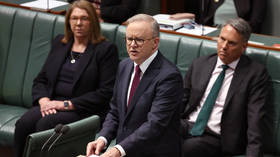
A bill on fighting “misinformation and disinformation” and “harm” aims to empower a government agency to police online expression
By Augusto Zimmermann, Professor and Head of Law at Sheridan Institute of Higher Education in Australia, President of WALTA – Legal Theory Association, and former Law Reform Commissioner with the Law Reform Commission of Western Australia

Australian Prime Minister Anthony Albanese (C) in the House of Representatives at Parliament House in Canberra © DAVID GRAY / AFP
The Australian Government has recently introduced in Parliament a new law proposal to ban officially unapproved online content. Digital companies are expected to adopt a code of conduct which will see them censor speech based on broad, vague and far-reaching directives.
The Communications Legislation Amendment (Combating Misinformation and Disinformation) Bill 2023 foreshadows the imposition of a legal obligation on digital platforms to police alleged ‘misinformation’ and ‘disinformation’. If that does not work, the law proposal provides for the full empowerment of the Australian Communications and Media Authority (ACMA) to directly intervene for the purpose of preventing ‘harm’.
Section 2 of the proposed legislation defines ‘harm’ as follows:
-
(a) hatred against a group in Australian society on the basis of ethnicity, nationality, race, gender, sexual orientation, age, religion or physical or mental disability;
-
(b) disruption of public order or society in Australia;
-
(c) harm to the integrity of Australian democratic processes or of Commonwealth, State, Territory or local government institutions;
-
(d) harm to the health of Australians;
-
(e) harm to the Australian environment;
-
(f) economic or financial harm to Australians, the Australian economy or a sector of the Australian economy.
The concept of ‘harm’ peddled by the bill is illusory, and its content would be subjectively determined by a powerful government agency. The definition of what is and what isn’t harm is malleable and can expand and contract depending on ACMA’s prevailing views. Ultimately, any type of speech with which the government is uncomfortable could be deemed ‘harmful’. For example, describing “disrupting social order” as serious harm could be interpreted to stop the organization of legitimate political protests. This could certainly be used to suppress legitimate political speech that should be part of a functioning democracy.
Above all, ACMA would gain sweeping powers to require any person to appear at a time and place of its choosing to answer questions about misinformation or disinformation. These powers include infringement notices, remedial directions, injunctions and civil penalties, including fines of up to AU$550,000 (US$358,000) for individuals and AU$2.75 million for corporations. Criminal penalties, including imprisonment, may also apply in cases of alleged “extreme harm.”

Read more
The provisions found in this law proposal put the communications and lives of free-thinkers, human rights defenders, independent journalists, and ordinary citizens under constant risk. They go in direct opposition to international human rights experts’ advice that “general prohibitions on the dissemination of information based on vague and ambiguous ideas, including ‘false news’ or ‘non-objective information’, are incompatible with international standards for restrictions on freedom of expression… and should be abolished.”
It is noteworthy that the Australian Government is exempted from the proposed legislation. Hence, the content issued by the government is never to be considered ‘misinformation’ but criticisms of the government by ordinary citizens can. It is certainly ironic that views incompatible with the government’s preferred narrative could be deemed to ‘harm’ the integrity of Australia’s democracy since it would disallow speech and expressive conduct that is integral to the maintenance of democratic processes.
In its 12-page submission to the Law Council, the Victorian Bar Association explains that this proposed legislation effectively creates an “unlevel playing field between governments and other speakers” that disadvantages government critics in comparison to government supporters. “The bill’s interference with the self-fulfilment of free expression will occur primarily by the chilling self-censorship it will inevitably bring about in the individual users of the relevant services,” says the Victorian Bar.
Above all, ACMA’s enforcement of the proposed legislation will inevitably stymie discussion of controversial topics, especially if they involve criticism of government policy and actions. This scenario is likely to unfold when the impugned speech is incompatible with the government’s official narrative. Thus, the proposed legislation targets those who, merely exercising their right to free speech, critically assess the desirability of government decisions and actions.
Other concerns with the proposed ‘misinformation’ legislation include the possibility of suspending the activities of internet companies in Australia if they fail to comply with the obligations created, as well as increased criminal penalties for libel and defamation which are incompatible with international human rights standards.
As can be seen, the proposed legislation constitutes a serious attack on the democratic right of Australians to free speech. Digital platforms will be legally obliged to police commentators’ discussion of controversial topics. Under this ‘misinformation’ legislation, any honest and robust debate about government policies will be effectively outlawed.
To conclude, our freedom of political communication is under attack in Australia. If the Misinformation and Disinformation Bill is enacted, then the free expression of ideas will be basically outlawed by the Australian Government. In short, the enactment of this law proposal will spell the end of authentic democracy in Australia. Australians are basically witnessing the transformation of their system of representative government into nothing more than a less open, or more disguised, form of elective dictatorship.
The statements, views and opinions expressed in this column are solely those of the author and do not necessarily represent those of RT.




